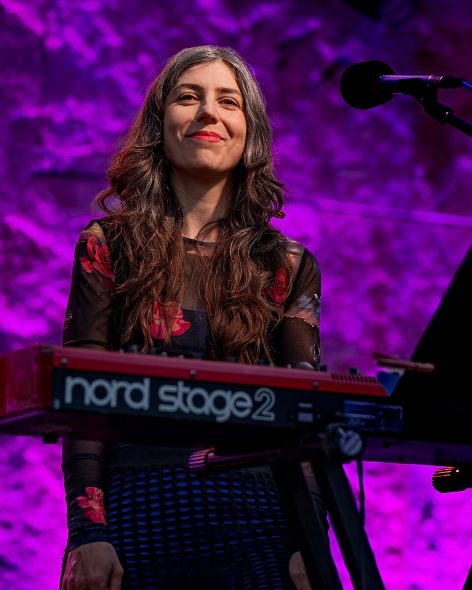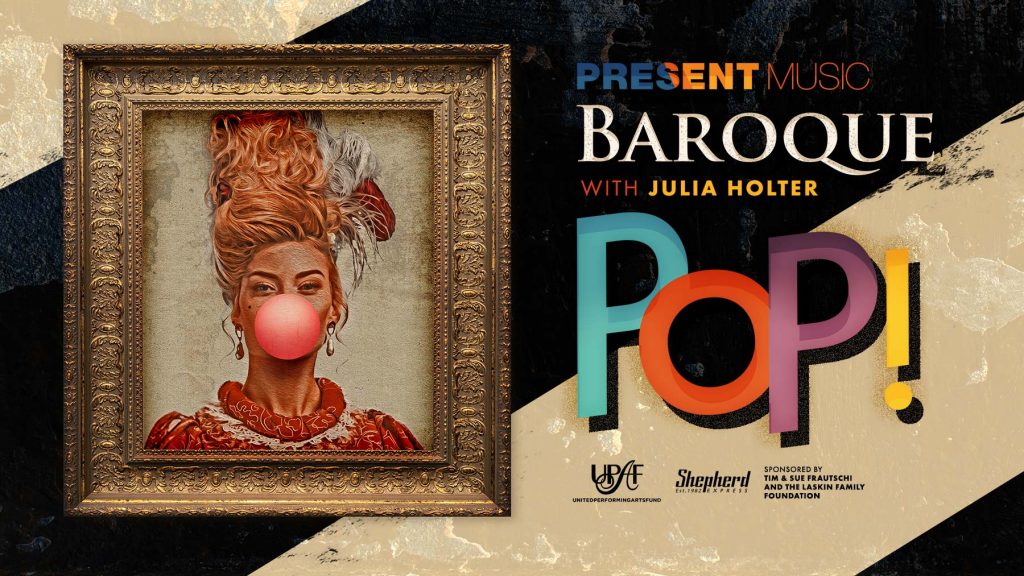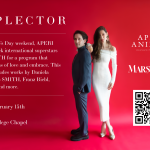Present Music Goes for Baroque
Featuring current composers like Julia Holter and Tashi Wada, who were influenced by Baroque music.
When a three-minute harpsichord piece composed over 300 years ago still captivates listeners, inspires contemporary composers, and appears in modern films and popular music, we must ask: what makes this miniature so magnetic? Present Music‘s performance of François Couperin‘s Les Barricades Mystérieuses next Sunday evening, May 25 at the Milwaukee Art Museum reveals how innovative musical ideas transcend their time, demonstrating why avant-garde composers today continue to find inspiration in Baroque techniques that once revolutionized 18th-century ears. The concert, Baroque Pop, features acclaimed artists Julia Holter and Tashi Wada alongside members of Present Music’s ensemble.

Julia Holter. Photo by Justin Higuchi. (CC 2.0)
The concert’s title holds dual meaning: it refers to the plucky, emblematic harpsichord at the center of the program and celebrates composers who draw inspiration from Baroque ideals while pushing into new sonic territories.
Les Barricades Mystérieuses (1717) revolutionizes the relationship between melody and harmony by dissolving conventional boundaries. Through Couperin’s masterful “style brisé,” new harmonies begin before previous ones finish sounding, creating a seamless flow where it becomes impossible to separate the tune from its accompaniment—what composer Thomas Adès calls “the development of melody from harmony and vice versa.” If less familiar with harpsichord, consider this arrangement for guitar to fully appreciate the effectiveness of this composition.
What makes this piece truly distinctive is Couperin’s ingenious approach to rhythm and musical tension. As certain notes linger, they temporarily “block” the expected harmonic path, creating delicious moments of tension before resolving into harmony. This creates a mesmerizing effect of continuous motion that somehow feels both forward-moving and suspended in time—like waves that don’t wait for previous ones to recede before forming anew.
Present Music Artistic Director Eric Segnitz describes the impact as “a sonic boom that has reverberated across centuries, impacting J.S. Bach, Chopin, Brahms, Richard Strauss, Ravel, Debussy, and current composers.”
Couperin’s innovative techniques resonate directly through this program’s featured composers. In the works of Holter and Wada, we hear Couperin’s legacy in their layered textures, blurred boundaries between melody and harmony, and creation of immersive sonic environments that both flow forward and seem suspended in time—demonstrating how this miniature masterpiece continues to inspire musical exploration three centuries later.
The harpsichord’s journey forms a through line for the concert. Segnitz observes that the harpsichord “enjoyed a surprising resurgence in the 20th century across multiple fronts—classical composers like Stravinsky and Ligeti incorporated it into modernist contexts, while in popular music, the instrument blended with the mosaic of newness and exotica (distortion pedals, feedback, sitars) employed by major bands like the Beatles, Beach Boys and The Doors.”
The concert presents several contemporary takes on Baroque innovation and instrumentation:
Baroque forms are borrowed in celebrated composer Caroline Shaw‘s Concerto for Harpsichord and Strings (2024). Segnitz describes Shaw as “pouring new wine into old bottles. She gets a lot out of the classical structures and kind of pours her own language into those.” Segnitz has arranged Shaw’s work to fit the evening’s core ensemble, harpsichord and string quartet.
Holter, a Milwaukee native now based in Los Angeles, brings her distinctive musical approach to the concert. Critics have described her as “far too singular of an artist to be boxed in as an art pop archetype.” Her songs from albums like Aviary (2018) and Have You in My Wilderness (2015) showcase her ability to create immersive sonic landscapes that critics have described as “lush,” “mesmerizing,” and “hauntingly beautiful.” Her performances feature sophisticated layering techniques where her mezzo vocals navigate through carefully constructed arrangements for harpsichord, string quartet, and synthesizer that reflect her classical training while incorporating ambient textures and experimental structures that blur the lines between chamber music and avant-pop.
Wada performs with a distinctive sonic palette that combines traditional instruments like bagpipes and harpsichord with synthesizers, creating what critics describe as “complex, pop-informed compositions that bristle with joy.” Wada’s work “explores resonance and dissonance, using alternative tunings and simple structures to generate rich and unanticipated perceptual effects.” His latest album, What Is Not Strange? (2024) represents a significant artistic evolution, with The Quietus noting how “he branches off from his minimalistic roots to sculpt layered and prismatic music that feels like abstract and distorted songs.”
The evening also features excerpts from Alex Temple‘s Behind the Wallpaper (2015), performed by the voice for which it was written—Julia Holter. Temple explains: “Many of the dreamlike images in the songs were inspired by my experience with gender transition, but my hope is that the story will feel familiar to anyone who has ever felt alienated from the broader culture.”
Closing a very successful season, Present Music has faced unexpected funding setbacks in preparing this concert. The organization recently lost a National Endowment for the Arts grant, part of widespread cuts affecting arts organizations nationwide. A recent email announcing the cuts of already awarded funds simply said, “The N.E.A. is updating its grantmaking policy priorities to focus funding on projects that reflect the nation’s rich artistic heritage and creativity as prioritized by the president.” The cancellation forced Present Music to reimagine the program, deferring a commissioned work by Viet Cuong to October.
Don’t miss this opportunity to experience an evening where Baroque sensibilities meet contemporary experimentation.
Baroque Pop! featuring Julia Holter and Tashi Wada takes place Sunday, May 25 at 7:30 p.m. at the Milwaukee Art Museum. For tickets and more information, visit online or call the box office at 414-271-0711. Tickets also permit access to museum exhibits throughout Sunday.
If you think stories like this are important, become a member of Urban Milwaukee and help support real, independent journalism. Plus you get some cool added benefits.
Preview
-
A Sacred Choir, 70 Voices Strong
 Dec 14th, 2025 by Martha Brown
Dec 14th, 2025 by Martha Brown
-
Prometheus Trio Goes Bohemian
 Dec 3rd, 2025 by Martha Brown
Dec 3rd, 2025 by Martha Brown
-
Present Music Offers New Choral Works
 Nov 20th, 2025 by Michael Barndt
Nov 20th, 2025 by Michael Barndt




















